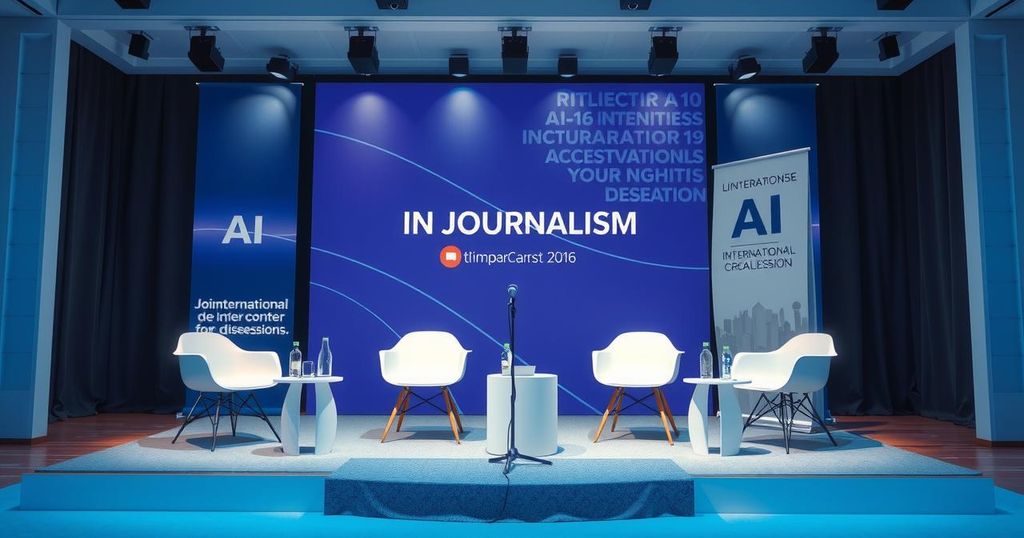AI
- STIFTUNG, ADEPA, ALESSANDRO, AMERICA, ANDRÉS D, ANDRES D ’ ALESSANDRO, ARGENTINA, ARTIFICIAL INTELLIGENCE, BELGIUM, BRASIL, BRAZIL, BRUSSELS, CARLOS EDUARDO HUERTAS, COLLABORATION, COLOMBIA, CUBA, CURRENT_AFFAIRS, EUROPE, FERN, FLIP, GONZALEZ, IFPIM, LATIN AMERICA, MARINA GAMA CUBAS, MARKET RESEARCH, MOMENTUM, NATALIA ZUAZO, NICOLE CARDOCH RAMOS, NORTH AMERICA, PAULA MIRAGLIA, RESEARCH, ROSA M, ROSA M. GONZÁLEZ, RUE DU TACITURNE, SOFÍA JARAMI, SOFIA JARAMILLO, SOUTH AMERICA, STIFTUNG, SUSTAINABILITY, TASK FORCE, TH
Amina Hassan
0 Comments
Exploring AI’s Impact on Journalism at World Press Freedom Day 2025
An international panel titled “Artificial Intelligence and Journalism” will take place on May 5, 2025, in Brussels. The event, part of World Press Freedom Day, will focus on the challenges and benefits of AI in Latin American journalism. Notable speakers will present insights on media sustainability and ethical implications of AI use. Participation options include in-person and virtual attendance.
In the lead-up to World Press Freedom Day 2025, an intriguing international panel is set to explore the intersection of artificial intelligence and journalism across Latin America. Titled “Artificial Intelligence and Journalism: How Media Outlets Are Covering and Using AI in Latin America,” the event takes place on May 5, 2025, at the Friedrich-Ebert-Stiftung in Brussels, Belgium. Co-organized by several key organizations, like UNESCO and the Argentine Association of Journalistic Entities, it aims to illuminate the various ways AI is reshaping the media landscape.
The two-hour panel will be conducted in both Spanish and English, with simultaneous interpretations available via Zoom, ensuring accessibility for a wider audience. It will kick off at 5:00 PM (GMT+2), featuring a mix of in-person and virtual attendance options. As media outlets wrestle with technological advancements, the discussion promises to delve into both the pitfalls and the potential of AI in journalism.
Panelists will tackle pressing issues facing journalists in the region. The first segment will address the challenges AI poses for press freedom and economic sustainability within media organizations. From regulatory hurdles to the balance between innovation and misinformation, this part aims to map the current landscape. Notably, insights from a recent UNESCO report on AI’s impact on journalism in Argentina, Brazil, and Colombia will be shared.
The second part promises a bit of optimism as it spotlights successful cases where media organizations have harnessed AI for good. Presenters from various organizations will discuss how AI tools enhance data journalism, fight against disinformation, and safeguard journalists from hate speech. They will share stories that highlight innovative strategies being implemented across the region.
The program is structured with well-timed segments, beginning with brief receptions and introductions, followed by keynote presentations and Q&A sessions from the audience. As a closing note, Rosa M. González from UNESCO will revisit key points made during the panel, ensuring reflections on the future of media in an AI-oriented world linger in the minds of participants.
Ultimately, this gathering will serve as a forum for insights into how AI is intertwined with freedom of expression, the sustainability of media, and the core principles of democracy, showcasing a crucial dialogue pertinent to today’s fast-evolving information landscape.
The upcoming panel on AI and journalism in Latin America aims to address the dual-edged sword of technology in media. Key discussions will cover the challenges AI presents to press freedom and financial viability, while also showcasing successful innovations enhancing journalism’s integrity. This event represents an important step for journalists and policymakers to engage in vital conversations about the future of media in the age of artificial intelligence.
Original Source: www.unesco.org




Post Comment